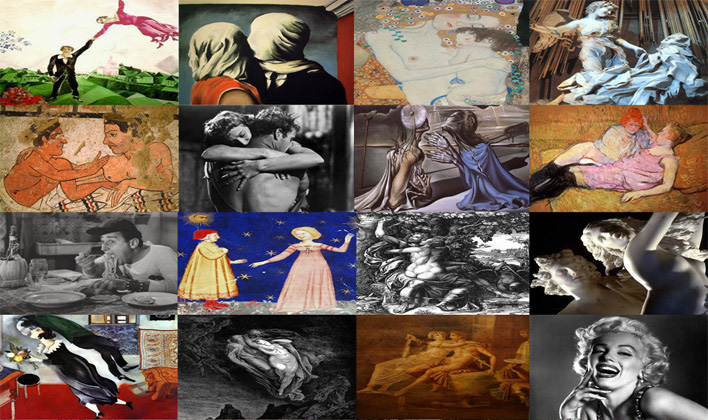Quegli oggetti oscuri: proiezioni e burattini del desiderio tra letteratura e cinema
Abstract
Attraverso il confronto tra alcuni testi letterari e cinematografici, l’articolo illustra una delle più fortunate figure di proiezione, o fantasma, del desiderio maschile: quella della seduttrice che mai si concede. Questa “allumeuse” che rende gli uomini altrettanti burattini di una dinamica seduttiva impossibile è al centro di La Femme et le Pantin (1898) di Pierre Louÿs (1870-1925), il quale ha creato l’indimenticabile personaggio della sivigliana Conchita ispirandosi anche alla giovane Charpillon che fece ammattire l’esperto seduttore Casanova. La fama di Conchita è stata rafforzata dalle numerose trasposizioni cinematografiche del testo, tra le quali bisogna ricordare quelle firmate da von Sternberg, The Devil is a Woman (1935) con Marlene Dietrich, da Duvivier, La Femme et le Pantin (1959) con Brigitte Bardot, e da Buñuel con la libera e geniale interpretazione di Cet obscur objet du désir (1977). In conclusione, la figura femminile che non si riesce a conquistare è una proiezione tanto del desiderio e dell’idealizzazione romantica quanto delle paure e delle convenzioni borghesi dei protagonisti maschili, come dimostra anche l’adattamento cinematografico del racconto Singularidades de uma Rapariga Loura (1874) del portoghese Eça de Queirós (1845-1900) portato al cinema nel 2009 da Manoel de Oliveira.
Downloads
Riferimenti bibliografici
Abruzzese, Alberto - Masi, Stefano, I film di Luis Buñuel, Roma, Gremese, 1980.
Bertetto, Paolo, L’enigma del desiderio: Buñuel, Un chien andalou e L’âge d’or, Roma, Biblioteca di B&N / Fondazione Scuola Nazionale di Cinema, 2001.
Buñuel, Luis, Dei miei sospiri estremi (1982), trad. it. Di Dianella Selvatico Estense, Milano, SE, 1991.
Casanova, Giacomo, Mémoires de J. Casanova de Seingalt, Paris, Garnier, 1880, VI.
Casanova, Giacomo, Storia della mia vita, Ed. Piero Chiara, trad. it. di Giancarlo Buzzi, Milano, Mondadori, 1965a, III.
Casanova, Giacomo, Storia della mia vita, Ed. Piero Chiara, trad. it. di Giovanni Arpino e Vincenzo Abrate, Milano, Mondadori, 1965b, V.
Cattini, Alberto, Luis Buñuel, Milano, Il Castoro / L’Unità, 1995.
Cescotti, Diego, (ed.), Riccardo Zandonai: Conchita. Rassegna della stampa d’epoca, Lavis, AlcionEdizioni, 2012.
Cescotti, Diego, (ed.), Di donne, burattini, armi ed amori, atti del Convegno L’enigma-Conchita indagato da letteratura, teatro, musica, cinema ed arti figurative (Rovereto, 13-14 ottobre 2006), Lavis, AlcionEdizioni, 2009.
Costantini, Costanzo, Le Regine del Cinema, Roma, Gremese, 1997.
Cristalli, Paola, “La femme et le pantin. Il film”, Catalogo della “XXIV Mostra Internazionale del Cinema Libero. Il Cinema Ritrovato” (Bologna, 24 giugno – 1° luglio 1995), Bologna, 1995.
Da Costa, Joāo Bénard, “Pietra di paragone. Il cosiddetto eterno femminile nell’opera di Manoel de Oliveira”, Manoel de Oliveira, Ed. Simona Fina - Roberto Turigliatto, Torino, Torino Film Festival, 2000: 161-187.
Dalì, Salvador, “L’Ane pourri”, Le Surréalisme au service de la Révolution, 1.1, (1930): 9-12.
Delon, Michel, “Préface”, La Femme et le Pantin, Paris, Gallimard, 1990: 7-24.
Di Maio, Mariella, Pierre Louÿs e i miti decadenti, Roma, Bulzoni, 1979.
Eco, Umberto, Il superuomo di massa, Milano, Bompiani, 1978.
Eco, Umberto, Il pendolo di Foucault, Milano, Bompiani, 1988.
Fleming, Ian, Live and let die, London, Cape, 1954.
Gara, Eugenio (ed.), Carteggi Pucciniani, Milano, Ricordi, 1958.
Goujon, Jean-Paul, Pierre Louÿs. Une vie secrète (1870-1925), Paris, Seghers / Jean-Jacques Pauvert, 1988.
Louÿs, Pierre, Conchita. La donna e il fantoccio, trad. it. di Matneer, prefazione critico-biografica di Achille Macchia e illustrazioni di C. Vasquez, Napoli, F. Bideri, 1915.
Louÿs, Pierre, La donna e il burattino, trad. it. di Martino Conserva, Milano, SE, 2001.
Masi, Stefano, “Il divismo europeo dagli anni sessanta”, Storia del cinema mondiale, Torino, Einaudi, 1999: 953-991, I.
Maynial, Édouard Casanova et son temps, Paris, Mercure de France, 1911.
Miller, Andrew, Casanova in love, London, Hodder and Stoughton, 1998, trad. it. di Sergio Claudio Perroni, Casanova innamorato, Milano, Bompiani, 2000.
Miller, Henry, Opus pistorum, trad. it. di Pier Francesco Paolini, Milano, Feltrinelli, 1984.
Mirandola, Giorgio, Pierre Louÿs, Milano, Mursia, 1974.
Praz, Mario, La carne, la morte e il diavolo nella letteratura romantica (1948), Firenze, Sansoni, 1986.
Puccini, Dario, Il segno del presente. Studi di letteratura spagnola, Alessandria, Ed. dell’Orso, 1992.
Queirós, Eça de, “Singolarità di una ragazza bionda”, Antologia del racconto portoghese, Ed. João de Melo, trad. it. di Vincenzo Barca, Roma, Cavallo di Ferro, 2006: 39-66.
Russo, Mariagrazia, “Note traduttologiche queirosiane”, Tra centro e periferia. Intorno alla lingua portoghese: problemi di diffusione e traduzione, Ed. Mariagrazia Russo, Viterbo, Sette Città, 2007: 127-145.
Sollers, Philippe, Une curieuse solitude, Paris, Seuil, 1958.
Turrent, Tomas Pérez - La Colina, José de, Conversations avec Luis Buñuel. Il est dangereux de se pencher au-dedans, Paris, Cahiers du cinéma, 1993.
Informazioni sul copyright
Questa licenza permette a terzi di riprodurre, distribuire, comunicare al pubblico, esporre in pubblico, rappresentare, eseguire, recitare e modificare quest'opera, purché vengano citati l'autore e la rivista. Questa è la più ampia tra le licenze Creative Commons, rispetto alle libertà concesse a terzi sulle opere licenziate sotto Attribuzione.









